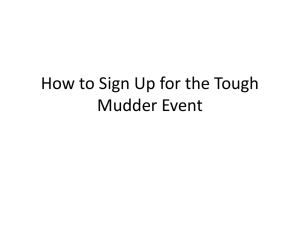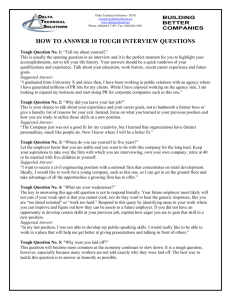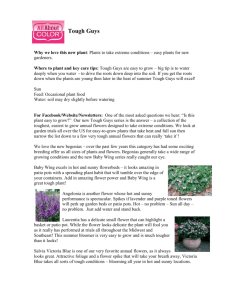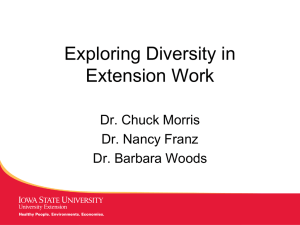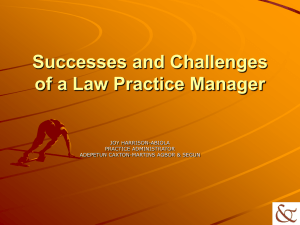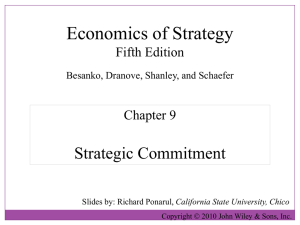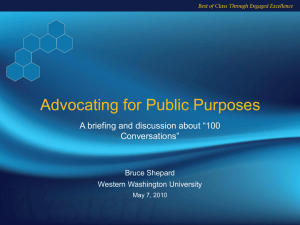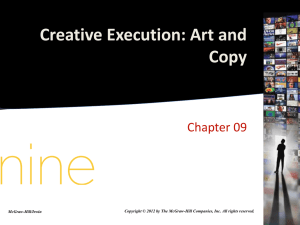Job Search Strategies in Tough Times
advertisement
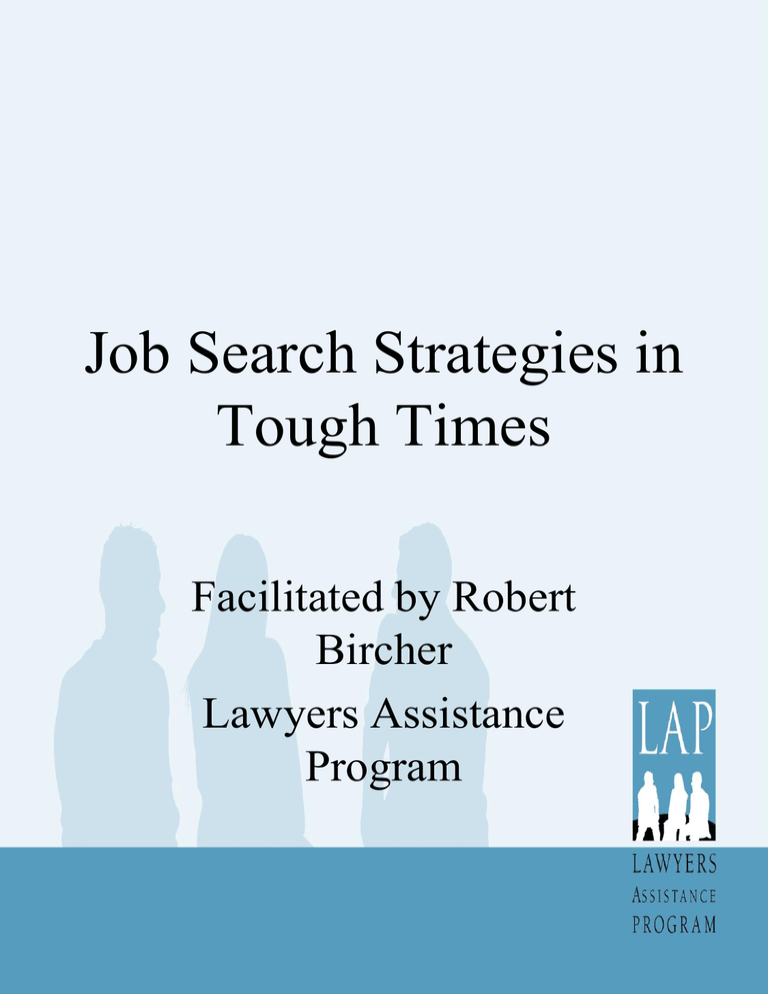
Job Search Strategies in Tough Times Facilitated by Robert Bircher Lawyers Assistance Program What Strategies to use in Tough Times? • The strategies are very similar to normal times with some exceptions-I am defining “tough times” as those; where due to economic contraction there are fewer legal jobs easily available • Lawyer demand occurs in cycles, depending on business prospects-we have had good times here for about 10 years-in some places in the USA things are very tough for lawyers now • In tough times articling students may not be hired no matter how good they are or no matter how hard they worked Tough Times • The “hit ratio” goes up-that is the ratio of contacts to short lists to offers in good times it might be 15/3/1-it takes 15 contacts or applications for 3 shortlists to get 1 offer • In hard times it might go to 30/2/1 or more • The bottom line is that it takes more effort and the “easy pickings” won’t be there • In some areas there may be “full saturation” of lawyers meaning moving to a place with more demand is a good idea Tough Times • “Salaried” jobs will be scarce or non existent in small firms or small markets • For those wanting private practice this means going job hunting with a “proposal” for a straight percentage or base salary plus a percentage or “eat what you kill” arrangements • For those lawyers with a few years experience this may mean going out on your own earlier than you wanted or may feel ready for (in perfect circumstances) Tough Times • For some lawyers it may mean jumping over to “Quasi- Legal” jobs or even non legal jobs • The main point is that you must broaden your horizons and drop preconceived notions of the way you envisioned things going with your career • The people who suffer in hard times are those who are rigid or myopic “I want a tier one law firm in downtown Vancouver with a top notch salary-nothing else will do” or “there is no way I am going to live in a small town” Tough Times • Some area of law are very susceptible to tough times-real estate goes up and down in terms of volume, merger and acquisitions slow down a lot in tough times when money is tight • Some areas of Law increase in tough times i.e.foreclosures, collections, divorces • If you are flexible you can ride one boom up then change areas and ride another down (real estate followed by foreclosures) • You must be flexible in tough times-sometimes quickly changing areas of practice-easier in some firms than others-being a one trick pony (being over specialized) is particularly dangerous in hard times • In really hard times being a partner easily shifts from being an asset to a liability-you get cash calls not draws in hard times Tough Times • Job hunting can be more difficult, especially if you are fairly inflexible-remember there is always demand for some area of law somewhere • You must do your search very effectively and do what works • You won’t be able to rely on many job ads being published or headhunters finding a job for you • Networking becomes indispensable rather than just very important What Works in Job Hunting? • Depends on who you want to work for-in private practice about 80% of successful lawyers use networking and informational interviews,15% published ads and 5% headhunters • With some employers like government and academia all jobs are advertised but often the job goes to an incumbent or someone who has networked effectively Being Proactive Works • Waiting for an ad that describes you perfectly is a fantasy-you will wait forever • Employers assume the way you look for a job is the way you will work-thus you want to demonstrate being proactive and showing hustle • In small or medium firms ads (especially for articling students) are rare or non existent • Drag and Drop works-in fact it is the only way to get most jobs in small to midsize firms How to get a Job Fast • 2 things determine how long it takes-how you search and how much time you put into it • How you search means putting your time into productive pursuits: networking, informational interviews, career assessments, drag and drops etc. • How much time-if you are unemployed 40 hours a week is good-if employed if you can do 5- 10 hours that is good (note this means productive time-not obsessing, worrying, fretting, tossing and turning at night etc.) Be Warm, Active & Interactive-Warm contact principle • Warm contact means some connection to another human-the opposite is cold contact i.e. sending an email • Active not passive-waiting for ads or an invitation is passive • Interactive-knowing someone in the organization (even briefly) is very helpful • Most jobs are secured by warm contact • Don’t rely solely on published ads Lawyer Specific issues • Resistance to “warm” techniques • Feeling of being “special or different” “I have all these degrees I shouldn’t have to hustle” is counterproductive • Marketing yourself can be solo, in a group or by leadership • Usually one on one is the most productive- i.e. coffee on a drag and drop Published ads • Not always about a job opening • Could be about a union requirement to advertise • Often job is already filled by interim candidate • Headhunters (ZSA or Counsel) are useful in special cases • Career counselors or job clubs are very useful Group Techniques • Job fairs • Volunteering-Increases your connection with the organization – Creates networking possibilities • LAP events • Attend seminars or lectures One on One • AKA-Networking • 75% of all jobs found this way-for some jobs in private practice this the only way • This is the hidden job market • People will hire someone they know over someone who is better qualified • No connection is too remote • In many small firms the idea to hire someone is stimulated by the presence of the person who is applying (for a job that doesn’t exist!) Networking and Informational Interviews • A process of community building • Don’t ask people “if they know of a job for you” it puts both of you on the spot use the informational interview technique instead • Ask for something that they can do-talk about themselves (they will listen for hours!) • Informational interview practice Resistance to Networking • What gets in the way of your networking? Most people don’t like doing it • It is usually some form of fear • i.e. “I am embarrassed” • The reason I’m not making the call is….. • Complete the sentence with 5 or 6 endings-the answers are the resistance you need to overcome • How can you reframe this? • TIC-TOC Resumes and Cover Letters • Should answer the questionsWhat can you do for my business? and Why should I interview you? • Focus on employers needs more than your credentials or goals • What skills are needed-Do my skills match? • You should also have a business card Resumes • • • • • Do your own Rewrite as required Emphasize your strongest points Show results-not just titles Be accessible and very easy to find • Be the person with the right skills, the right knowledge base, motivation and results Resumes-2 • Be descriptive of your skills, experience and credentials • Content has only one purpose-to prove you are well qualified to do the job • Chronological resume-used for similar jobs up the ladder • Most common form of Resume in Law Resumes-3 • Functional resume-used if your background is varied-ie. law and management • Organizes by category • Targeted resume-used for a specific job-or when you are off in a new direction • Show your qualifications-describe actual achievements rather than listing job titles and dates Resumes-4 • Be descriptive-not flowery • Describe tangible, measurable, results ie.got 500k award for client • Always mention law degree,even for non law jobs-it is an impressive credential • If more than 5 years-lead with accomplishments not degrees Special Situations • Gov’t jobs-describe education and training using exact words in job description • “disconnect your natural intelligence and creativity and break up your education and employment history into a large number of tedious redundant paragraphs” Special Situations • Scannable resumes-focus on key words, use industry jargon and nouns • Use key action wordsdeveloped,delivered,negotiated,m anaged etc. • Use basic fonts, avoid italics,bullets,underlining,graphics etc. • Use one side only Professional Profile • Can be used instead of a cover letter • Story style format-who are you and what do you want-in 3-5 sentences-lets do one now! • Some consultants say this is more effective than traditional resumes
